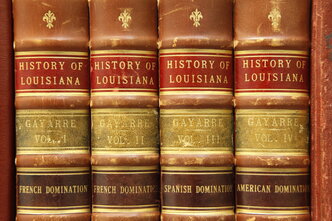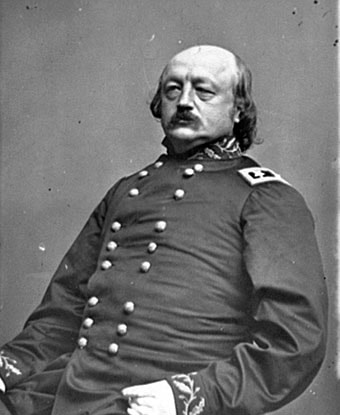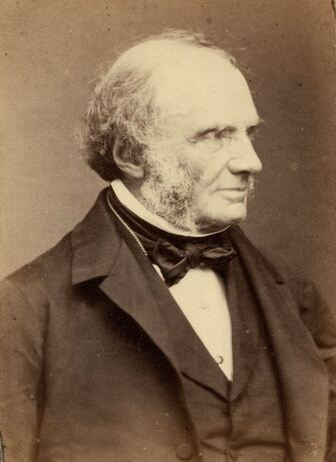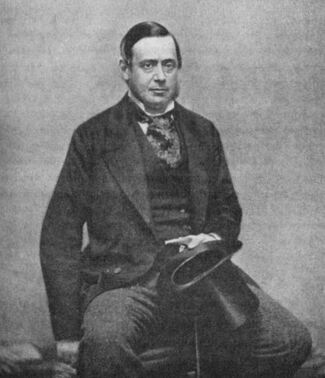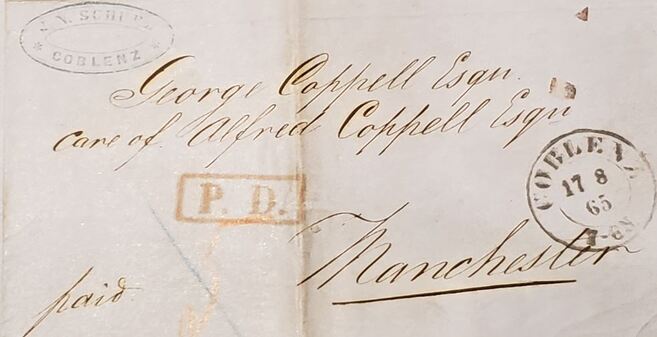THE COPPELL PAPERS
ITEMS OF SPECIAL INTEREST
ITEMS OF SPECIAL INTEREST
LOUISIANA HISTORICAL CENTER
The Coppell Papers are owned by the Louisiana Historical Center which is located in the Donald M. Marquis Reading Room on the second floor of the Jazz Museum in New Orleans. They have not yet been digitized. To view the collection in person, an appointment must be made in advance along with completing forms regarding the handling of the documents. On November 29th, 2023, Philip LaBerge with the Coppell Historical Society and Museum visited the reading room to view the documents. The documents are referenced on the following pages as follows.
|
Click
|
Click
|
Click
|
Click
|
The Coppell Papers are an extraordinary collection documents that reveal a wealth of information which was previously unknown about George Coppell. Below are some items of special interest found in the collection.
ITEMS OF SPECIAL INTEREST
- George Coppell emigrated from Liverpool to New Orleans around 1857 at the age of 20. As stated in his obituary in the Times Newspaper in Englewood, NJ, "He was a young man full of energy and determination, and by dint of perseverance he obtained employment in the old established English banking house of A. & J. Dinistown & Company. He remained with these bankers until the year 1860, when he became the assistant of William Mure, Esq., the English Consul at New Orleans. In 1862, Mr. Mure died, leaving the consulate with no one in charge but young Coppell." Read the complete text here
- In Wheelice (Pete) Wilson's paper on George Coppell, he conjectures that "he was probably wealthy when he immigrated from England to New Orleans since he was appointed to a high political office there and since he married a prominent New Orleans lady." As mentioned above, George Coppell first worked at a bank. The fact that he was an employee at a bank suggests that he was not wealthy when he arrived. He then worked as an assistant to the British Consul, William Mure. When Mure, died, he assumed the role of Acting Consul. Because there was a blockade around New Orleans at the time, there was no way for George Coppell to communicate with London and be officially appointed. It wasn't until 1862 that he was appointed. He was appointed because there was nobody else there to fill the position, not because he might have come from a wealthy family.
- When the British Consul in New Orleans, Willam Mure, Esq., died in April of 1862, George Coppell assumed the role of Acting-Consul. It was just one month before the cataclysmic blockading of New Orleans by the Union Army under the command of Major General Benjamin F. Butler. George Coppell had a number of communications with Butler.
- George Coppell included ESQ when he wrote his name. The 1826 edition of William Blackstone's Commentaries on the Laws of England reiterated that "the title should be limited to those only who bear an office of trust under the Crown and who are styled esquires by the king in their commissions and appointments; and all, I conceive, who are once honored by the king with the title of esquire have a right to that distinction for life." How George Coppell received that title is unclear, but it is assumed that it came with the job when he was appointed as British Acting-Consul.
- On March 22, 1864, George Coppell, who was Acting British Consul at the time, wrote a letter to Lord John Russell (1st Earl Russell) who was the British Secretary of State for Foreign Affairs. (He became Prime Minister 10/29/1865.) In it he requests that he be appointed Consul and describes the extraordinary efforts that he made as Acting-Consul for the last two years during the Civil War. He included a long list of prominent New Orleans citizens and merchants who supported his appointment.
On May 23, 1864, Lord Russell replied stating that he had conferred with Queen Victoria and that they had decided not to appoint him as Consul. The reason for that decision is unknown. They decided to appoint Denis Donohoe, the Consul in Buffalo, to take the position.
- After his effort to be promoted to Consul was rejected by Lord Russell, George Coppell wrote a letter on 7/7/1864 to the British Ambassador, Richard Lyons, requesting that he be relieved of office. On 8/10/1864, Lyons responded saying that he did not have the authority to accept his resignation and that it would be best if he held on until his replacement arrived. He noted his years of good service. About four months later on 12/29/1864, Denis Donohoe, the British Consul in Buffalo wrote George Coppell stating that he had been given his marching orders to come to New Orleans to be Consul. Richard Lyons, however, may have may have communicated with Lord Russell before Donohoe left Buffalo. Denis Donohoe didn't arrive in New Orleans for another year and 8 months, just after George Coppell's departure for New York on 8/16/1866.
- When accepting his position with Maitland, Phelps & Company, he states, "I think it proper to state that though I have a knowledge of the French language, I am not sufficiently (comfortable) to correspond in it. I shall be glad to know if it is essential in the situation you have so kindly offered me." Why is it important to discover that Geoge Coppell spoke French in French speaking New Orleans? Like the many Coppells in Liverpool, before immigrating to New Orleans, George Coppell would have pronounced his name like Ted Koppel. The French phrase "Qu'Appelle" which means "who calls" is pronounced exactly the same that we pronounce Coppell, today. Moreover, that is the way they pronounce it in French speaking Coppell, Ontario and also the Qu'appelle Valley in Saskatchewan. According to the Tenafly, NJ Historical Society, that is the way that the Coppell family pronounced it, too.
- George Coppell had a brother named Alfred in Manchester who acted as his agent. See letter dated 8/17/1865.
COPPELL HISTORICAL SOCIETY, P.O. BOX 1871, COPPELL, TX 75019
[email protected]
The Coppell Historical Society is a 501 (c)(3) non-profit organization
